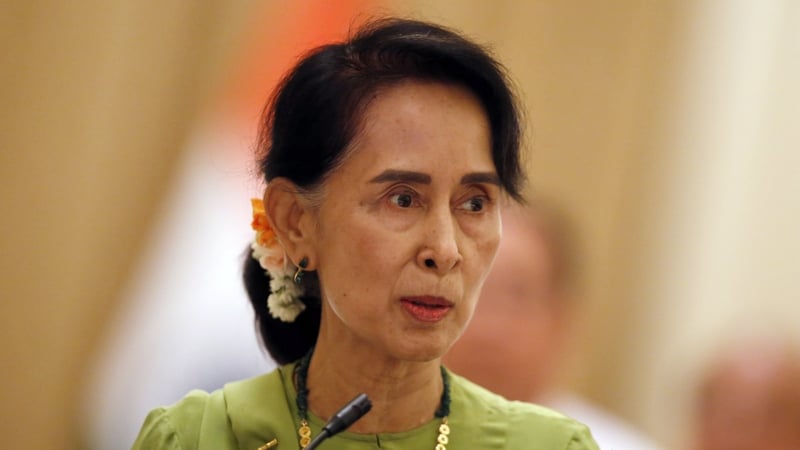
Myanmar leader Aung San Suu Kyi, facing outrage over ethnic violence that has forced about 370,000 Rohingya Muslims to flee to Bangladesh, will not attend the upcoming UN General Assembly session in New York.
The crisis over the security forces' fierce response to a series of Rohingya militant attacks is the biggest problem Ms Suu Kyi has faced since becoming Myanmar's leader last year.
Critics have called for her to be stripped of her Nobel peace prize for failing to do more to halt the strife.
In her first address to the UN General Assembly as national leader in September last year, Ms Suu Kyi defended her government’s efforts to resolve the crisis over treatment of the Muslim minority.
This year, her party spokesman said she would not be attending, although he said he was unsure why.
"She's never afraid of facing criticism or confronting problems. Perhaps she's got more pressing matters here to deal with," Aung Shin, a party spokesman, told Reuters.
International pressure has been growing on Myanmar to end the violence in the western state of Rakhine that began on 25 August when Rohingya militants attacked about 30 police posts and an army camp.
The attacks triggered a sweeping military counter-offensive that refugees say is aimed at pushing Rohingya out of Myanmar.
Reports from refugees and rights groups paint a picture of widespread attacks on Rohingya villages in the north of Rakhine by the security forces and ethnic Rakhine Buddhists, who have put numerous Muslim villages to the torch.
But Myanmar authorities have denied that the security forces, or Buddhist civilians, have been setting the fires, instead blaming the insurgents.
Nearly 30,000 Buddhist villagers have also been displaced, they say.
US President Donald Trump’s administration has called for protection of civilians, and Bangladesh says all of the refugees will have to go home and it has called for safe zones to be created in Myanmar to enable them to do so.
But China, which competes with the United States for influence in the Southeast Asian nation, said yesterday it backed Myanmar's efforts to safeguard "development and stability".
The military, which ruled for almost 50 years until it began a transition to democracy in 2011, retains important political powers and is in full control of security.
Ms Suu Kyi has no say over those matters.
The UN Security Council is to meet today behind closed doors for the second time since the latest crisis erupted.
British UN Ambassador Matthew Rycroft said he hoped there would be a public statement agreed by the council.
However, rights groups denounced the 15-member council for not holding a public meeting.
Diplomats have said China and Russia would likely object to such a move and protect Myanmar if there was any push for council action to try to end the crisis.
UN seeks "massive" aid boost amid Rohingya emergency
Aid agencies have to step up operations "massively" in response to the arrival in Bangladesh of about 400,000 Rohingya refugees, a senior UN official said.
"We will all have to ramp up our response massively, from food to shelter," George William Okoth-Obbo, assistant high commissioner for operations at the UN refugee agency, told Reuters during a visit to the Kutupalong refugee camp in Bangladesh.
We have an emergency within an emergency with conditions in existing camps
Bangladesh was already home to about 400,000 Rohingya, who fled earlier conflict in Myanmar including a similar security crackdown in western Myanmar's Rakhine state in response to militant attacks last October.
Many of the new arrivals are hungry and sick, without shelter or clean water in the middle of the rainy season.
Last week, the United Nations appealed for $77 million to cope with the crisis but Mr Okoth-Obbo said that would not now be enough.
He declined to say how much he thought was needed or whether he thought aid agencies were getting proper access to the conflict zone in Myanmar, though he said it was important to ensure that people were safe where they were.
Mr Okoth-Obbo said he agreed with the Bangladeshi position that the most important solution was for the refugees to be able to return home in safety.
Bangladeshi Prime Minister Sheikh Hasina said yesterday that the refugees would all have to go home and Myanmar should set up safe zones to enable them to do so.
Many of the new arrivals are hungry and sick, without shelter or clean water in the middle of the rainy season.
Last week, the United Nations appealed for $77 million to cope with the crisis but Mr Okoth-Obbo said that would not now be enough.
He declined to say how much he thought was needed or whether he thought aid agencies were getting proper access to the conflict zone in Myanmar, though he said it was important to ensure that people were safe where they were.
Mr Okoth-Obbo said he agreed with the Bangladeshi position that the most important solution was for the refugees to be able to return home in safety.
Bangladeshi Prime Minister Sheikh Hasina said yesterday that the refugees would all have to go home and Myanmar should set up safe zones to enable them to do so.
Comments
Post a Comment